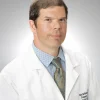Dyspnea, or shortness of breath, is a sensation you may feel when you cannot get enough air into your lungs. You may feel this during everyday tasks or when you’re taking part in strenuous activity.
Lung and heart conditions can cause dyspnea. Both organs are responsible for oxygen flow to parts of your body and the release of carbon dioxide. When these organs develop problems, you may feel tightness in your chest and difficulty breathing.
The severity of shortness of breath can vary depending on the underlying cause and how it affects your body.
You may experience shortness of breath from time to time, or it may be a chronic health issue. Older people and people with underlying health conditions may experience shortness of breath, but it also occurs in healthy people.
“There are several requirements for efficient breathing,” says Nathaniel Weathington, MD, a pulmonologist who practices at Pulmonary Consultants-UPMC in the Allegheny Kiski-Valley region. “We have to be strong enough to move the air in and out of our lungs. Our lungs must transfer the oxygen into the bloodstream efficiently, and the heart and blood system needs to move the blood through the body to get oxygen to all the places that need it.
“There are specific diseases that can affect each of these processes and prevent oxygen delivery, which will result in shortness of breath.”
Risk Factors for Dyspnea
Various factors may increase your risk of experiencing shortness of breath, including:
- Anxiety.
- Asthma.
- History of smoking.
- Lung or heart conditions.
- Severe obesity.
Most of these conditions require medical care. Your doctor may recommend medication or lifestyle changes, such as losing weight or quitting smoking, to help.
“We want to see what we can do to get the maximal improvement for our patients, whether that is referring for a procedure, optimizing medicines for the heart, giving inhaled medicines, or referring for physical therapy,” Dr. Weathington says. “It is very different for each of our patients. We take an individualized approach to care.”
Never Miss a Beat!
Subscribe to Our HealthBeat Newsletter!
Thank you for subscribing!
You can now select the specific newsletters you'd like to receive.
You are already subscribed.
Subscribe to more newsletters in our email preference center.
Sorry, an error occurred. Please try again later.
Get Healthy Tips Sent to Your Phone!
What Are Common Causes of Shortness of Breath?
Shortness of breath is a common symptom of several health conditions. Some of these conditions may develop over time, while others occur suddenly:
- Asthma.
- Blood clot in the lungs.
- Heart attack.
- Low blood pressure.
- Panic attack or distress.
- Pneumonia.
Sometimes, exercise, poor air quality, temperature, or changes in altitude can cause shortness of breath. In these instances, rest may resolve your symptoms.
Sudden Shortness of Breath
Asthma attacks, allergic reactions, or airway obstructions (choking) can cause sudden shortness of breath. If breathlessness does not subside or if you also experience chest pain, you may need immediate medical attention or hospital care.
Long-Term Conditions and Dyspnea
Chronic breathlessness is a condition defined by an increased shortness of breath over time (four weeks or longer). Certain conditions can cause chronic breathlessness:
Chronic Obstructive Pulmonary Disease (COPD)
COPD is a condition that damages lung tissue. Long-term smoking can cause COPD, which results in dyspnea. COPD can affect air passageways in the lungs.
Asthma
Asthma constricts the air in your airways and creates a buildup of mucus. This causes difficulty with breathing. Allergies, infections, or smoking can trigger asthma. The condition can interfere with daily activities and cause symptom flare-ups.
Pulmonary fibrosis and pulmonary hypertension
Pulmonary fibrosis causes stiff and thickening lung tissue. It is a serious condition and may increase in severity. It can cause shortness of breath, fatigue, and coughing.
Pulmonary hypertension increases blood pressure in the lungs because of blocked blood vessels. It may cause chest pain, shortness of breath, and dizziness.
Heart disease or heart failure
Heart disease is the leading cause of death in the United States. When your heart cannot correctly fill and empty, fluid can collect in your lungs. This can cause difficulty breathing. This can occur with other heart conditions like high blood pressure or diabetes.
Obesity
Being overweight or obese can cause shortness of breath in daily activities due to strain on your heart and lungs. A doctor may assess whether weight loss or exercise can help reduce your symptoms.
When to See a Doctor for Shortness of Breath
If you’re experiencing shortness of breath, you may need emergency medical attention. Monitor your symptoms and get care if you experience any of the following:
- Chest pain.
- Coughing up blood.
- Fainting or dizziness.
- Memory loss.
- Nausea.
- Numbness in lips or nails.
These symptoms could signal a heart attack or another serious condition. You should seek medical attention if feelings of breathlessness persist.
Shortness of breath also is a symptom of COVID-19. If you test positive for COVID-19 and experience this symptom, it is important to contact a doctor. It can result in pneumonitis and pneumonia or hospitalization if not addressed.
UPMC’s pulmonary experts can help with a wide variety of lung and breathing conditions, including shortness of breath. To find a provider near you, visit our website.
Editor's Note: This article was originally published on , and was last reviewed on .
About UPMC
Headquartered in Pittsburgh, UPMC is a world-renowned health care provider and insurer. We operate 40 hospitals and 800 doctors’ offices and outpatient centers, with locations throughout Pennsylvania, Maryland, New York, West Virginia, and internationally. We employ 4,900 physicians, and we are leaders in clinical care, groundbreaking research, and treatment breakthroughs. U.S. News & World Report consistently ranks UPMC Presbyterian Shadyside as one of the nation’s best hospitals in many specialties and ranks UPMC Children’s Hospital of Pittsburgh on its Honor Roll of America’s Best Children’s Hospitals. We are dedicated to providing Life Changing Medicine to our communities.

